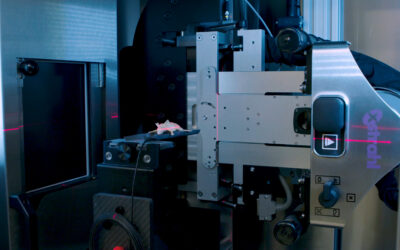
Stereotactic body radiation therapy offers good lung local tumor control by the administration of a high dose per fraction in small volumes. Stereotactic body radiation therapy preclinical modeling is now possible, and in their paper “Lung Stereotactic Arc Therapy in Mice: Development of Radiation Pneumopathy and Influence of HIF-1α Endothelial Deletion” Lavigne J, Suissa A, Verger N, Dos Santos M, Benadjaoud M, et al, aim to develop a model of focal irradiation of the mouse lung and to investigate the impact of conditional hypoxia-inducible factor 1α (HIF-1α) deletion in the endothelium on radiation-induced tissue damage.
The Small Animal Radiation Research Platform was used to create a mouse model of focal irradiation of the lung using arc therapy. HIF-1α conditional deletion was obtained by crossing mice expressing Cre recombinase under the endothelial promoter VE-cadherin (VECad-Cre+/+ mice) with HIF-1α floxed mice.
Lung stereotactic arc therapy allows thoracic wall sparing and long-term studies. However, isodose curves showed that neighboring organs received significant doses of radiation, as revealed by ipsilateral lung acute red hepatization and major gene expression level modifications. Conditional HIF-1α deletion reduced acute lung edema and tended to diminish neutrophil infiltrate, but it had no impact on long-term global tissue damage.
Arc therapy for focal high-dose irradiation of mouse lung is an efficient model for long-term studies. However, irradiation may have a strong impact on the structure and function of neighboring organs, which must be considered. HIF-1α conditional deletion has no beneficial impact on lung damage in this irradiation schedule.
This Xstrahl In Action was adapted from an article found on a National Library of Medicine website.
SPOTLIGHT: Behind the Beam: Tips, Tricks, and Translational Research from the Karolinska Institutet X-ray Irradiation Core Facility
Access the highly anticipated Xstrahl SPOTLIGHT Session, "Behind the Beam: Tips, Tricks, and Translational Research from the Karolinska Institutet X-ray Irradiation Core Facility," on demand now. This essential recording is a must-watch for radiation researchers and...







